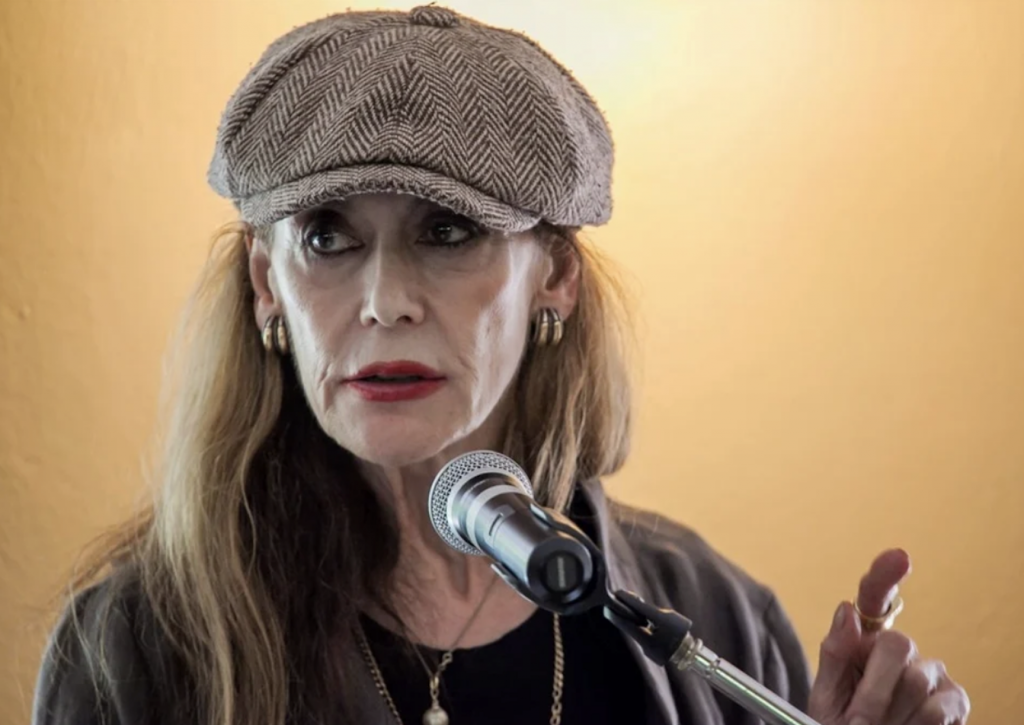
Jani Allan
Jani Allan (11 September 1952 – 25 July 2023)

Isobel grew up across the road from where I grew up in Bryanston. Eaton Avenue. With Mrs. Fry, her adoptive mother. And a pack of some 20 to 30 feral dogs that would tear a black man to shreds at every opportunity. When I say feral let me explain. On two occasions after we met and became friendly in 1973, when I was 12 and she was 20, I was invited to visit her home, for tea. As was customary in Bryanston at that time. That is how I first met Mrs. Fry.
We lived in 3 acre properties on opposite sides of Eaton Avenue. The houses were set back from the gate by some distance. I entered their gate and walked towards the house, whereupon a pack of some 30 wild dogs – slathering at the mouth and clearly out of control – came barreling towards me, all abark.
Across the road, I grew up with two police trained attack German shepherds. I knew how to deal with dogs. But these were not ordinary dogs. They were completely undisciplined. All large. All crossbreeds. Feral. Out of control. Nothing would stop them.
The first time they ran at me I knew this was life threatening danger. Intuitively my survival instinct told me kick as many in the head until they learned to cease and desist. It was my introduction to life and death decision making on the fly. Along with the value of killing in self defense. By the time enough skulls were cracked to end this frenzied attack I was lacerated with bites. Maybe ten of them got a good chunk from my 12 year old legs and arms. I was at the time in short pants – so it was all too easy for them. The only advantage I had was the adrenaline of sheer terror and the willingness to aim my kicks at the side of the target dogs head.
I will never forget the moment when I knew that if I went down I would be eaten alive. My first glimpse of mortality. My first lesson in surviving by any means necessary. One of many lessons my friendship with Jani enabled.
The second time I was invited for tea I came prepared. I brought a metal rod. (A car jack.) Although Isobel said “Don’t worry, I will lock the dogs up” when I opened the gate and started walking towards the front door the same thing happened. The feral pack appeared from behind the house, howling in barking unison as they charged towards me. That time very few got close enough to bite me.
Growing up in South Africa enabled some unusual life skills offering problem solving challenges pivoting on life or death outcomes. I don’t know what Mrs. Fry did with the bodies of those dogs. At the time I thought she let the other dogs eat them. With hindsight I think that is highly probable. Just as I suspected then, as now, it was her who set that pack of dogs on me. Both times. She did not approve of her 20 year old beauty being so friendly with a 12 year old Greek. That much was always made clear.
She never apologized to me, after each incident. I thought Mrs. Fry was never less than a crazy woman who thought rescuing dogs to assemble a protective ring around two women living alone in a big house with the Swart Gevaar. Never caring that her pack of (as she called them K(word) dogs) dogs might savage a 12 year old child to death? I know several black workers were attacked on Mrs. Fry’s property by those dogs. Badly savaged. I have no memory of Mrs. Fry that is not stained with unpleasantness.
I remember cycling down my driveway one day and noticing a man on the ground outside her house, unable to even walk. I went over to look. A young man, maybe in his twenties, in rags, bleeding profusely from multiple lacerations, crying quietly. In shock. Of course I stopped and helped him cross the road to my house where I cleaned up his wounds with cotton wool and Dettol and gave him food and water. Open bleeding wounds that I tried to plaster over. “Thank you baas.” I was 13. He was much older and had been badly wronged but he still knew enough to call me baas.
I remember the deep disgust I felt for Mrs. Fry putting me in this position. I was made a witness to injustice. A South African variant of a good ol southern lynching. The feral dog pack ensured no Blacks came knocking on that door looking for work.
Mrs. Fry owned and ran Quinneys in Randberg. An Antique shop where she presented the most astonishing variety of random bric a brac. Isobel being eight years older than me had a driving license and a little sports car. When I was in my early teens she would take me to Quinneys in Randberg. I would spend hours wondering round the piles of old junk looking at the bizarre choices on offer that made no sense to me. Steptoe and Son had nothing on Mrs. Fry.
I was always a bit afraid of Mrs. Fry. So was Isobel. I think that’s why we became confidantes despite our age difference. I was for a time her closest escape from the ever vigilant Mrs. Fry. Capable of listening to her thoughts without prejudice. The terrifying looming presence of Mrs. Fry was our common ground. A pillar of nothingness. No backstory. No husband. No nothing. Not even a feathered acquaintance with common courtesy. All I saw was a brusque bully of an aging thug-woman in old Nazi lady clothes. Who collected large stray dogs to protect her from the Black menace; piles of valueless garbage for her antique shop, and one probably-Italian baby child unwanted by her biological parents.
She seemed to hate me. And everyone else she saw. Especially the black workers. I cannot imagine growing up in that environment alone. The pathology of my relationship with Jani began with this impression that I could help her escape Mrs. Fry. I was a rescuer of troubled women from an early age. By that time my older sister’s struggles with anorexia had already started my therapist training. Jani had a similar vulnerability to my sister Kathy.
Mrs. Fry was the first person I saw racially abusing a Black person. Probably I have Mrs. Fry to thank for my early embrace of liberal politics, so odious was her representation of South Africa’s racist christian right. I never understood the dynamic of her relationship with the adopted daughter. She appeared to hate her as much as everything else she hated. I did not know then what I do now about the harm a malevolent mother can visit on a neural pathways of a growing child. The development and shaping of the young brain with landmines that would never be fully cleared.
Before she married well, met Tertius Myburgh, and became a glamorous Sunday Times columnist Isobel was for a (very) brief time an art teacher at Bryanston High. She had a Bachelor of Arts degree.
At the height of her celebrity as a Sunday Times columnist she would very occasionally come to my gigs when I was a musician/student playing smart venues in Johannesburg.
Then I never saw her again for many years until she called me in my London home in the early 90’s. “Help. I have to get out of South Africa, they are trying to kill me.” She arrived in my home the next day.
I housed her in my London home at short notice (months for free; my pattern of rescuing damaged women in distress in my lovely Thameside home, a kindness that would have consequences. (No good turn goes unpunished, but that’s a separate story.)
Later I helped her settle in the UK. With actual monetary help and introductions. She appeared unexpectedly at different times in my life, over a fifty year period. With a sisterly familiarity and expectation; when she was in need of help.
Jani possessed what presented as a super high intelligence. But with a blonde blind spot, as so many super-intelligent have. The blind spot. I remember the many nights we spent in deep philosophical conversation in Johannesburg and in London where her insights were on a high level. At times I thought her cognitive skills approached brilliance, although always with a shadow. Especially soon after we met in 1973, when I was 12, sitting with her under the tree near the fence of my Eaton avenue home, watching her smoke and talk tirelessly about Norma Jean Mortenson. When her focus was on Jani was a marvelously gifted storyteller.
I choose to not remember her landmine bad decisions, the big two; finding Jesus; letting him take the wheel; and identifying as a right wing fascist.
I think the second was a trauma outcome after what Nick Broomfield’s lawyers at Channel 4 did to her in that court case in the early 90’s. It was shameful. For all involved. That event, that verdict in “The libel case of the century” ended her life as a creative force. It crushed a bruised spirit already frail after a brutal upbringing by Mrs. Fry. I think she really did not deserve the death sentence that verdict represented. The South Africans who helped Nick Broomfield’s lawyers do that to her are by my measure of excrement, scum. Lying out of jealousy and for a free trip to London. They can properly celebrate their win today, their victory complete.
I think if one word was all I had to remember her by since I first met Isobel when we started our friendship of confidential chats in 1972, it would be tragedy.
She was a contender for making a change in the world. She had skills, could sway opinion. Being a light. The tragedy is that she turned right instead of left. Chose superstition over science. And for that I credit Mrs. Fry and her developmental landmines.
She terrified me as a child. I don’t think Isobel ever recovered from that childhood grooming even after she changed her name. I know she never recovered from that moral turpitude I witnessed in Britain’s libel court.
We never spoke in her final years. I feel sorry that I was unable to help more than I did.
I didn’t know until recently that she went back to South Africa for a time. But this story by Robert Timothy, her radio producer, does seem to reflect the traumatic reaction I saw after the Channel 4 verdict.
#JaniAllan
Amazon Bookstore for Paperback and Kindle
Apple Books on EPUB here
My Paypal Patrons support is here

Comments are closed, but trackbacks and pingbacks are open.